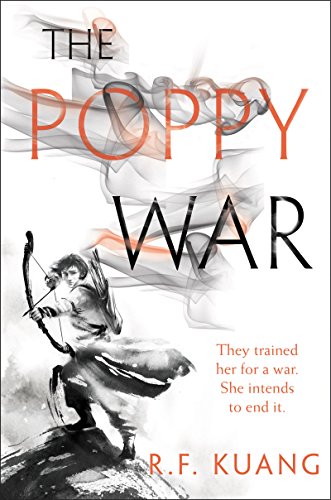In a secondary fantasy world inspired by early 20th Century China, a young woman’s determination and drive to succeed and excel at any cost runs into the horrors of war, conflict and ancient, suppressed forces in R. F. Kuang’s excellent debut novel, The Poppy War.

The Poppy War is the story of orphan Rin. When we meet her, she is working for her adoptive family as little better than a slave. Her family, petty drug dealers in a backwater portion of the nation of the Nikara Empire, uses and abuses her mercilessly. Rin has dreams, however, dreams of escaping her backwater province, and the manipulations of her family. In the Empire, the civil service examinations, the Keju, hold the promise of a meritorious escape to one of the schools of the Empire. And once there, she can be free to study what she wishes, or so she hopes. For, once she does make it to the Sinegard, the premier academy for military matters, Rin realizes just what a wider world she has steeped into, a world that is at the brink of war with the grasping nearby Federation of Mugen. Rin’s hitherto unknown talent and her connection to the Gods is not only discovered, but tested and strained to the breaking point.
As you might imagine, given that synopsis, in a thick fantasy novel like this, a lot is going on, even if we are in a strict and focused single point of view. The Poppy War takes Rin from her origins through the horrors of war in pacing that is assured and deeply connects us to the character and her travails. The first portion is her coming of age and escape from her unhappy circumstances, the middle portion is the travails at academy, and the final portion is full-on horrors of war and combat. Throughout, the author builds and layers character development, growth and change, really making this Rin’s story even as she reveals the deep detail of the world.
And what a world. The early 20th century China model is clear from the get-go, a precarious empire that has suffered wars with neighbors and only by intervention from the outside, and some luck, has managed to hold on. And even so, local warlords, squabbling for power and their own gain and security, cannot cooperate even as the Federation of Mugen (which has clear analogues to the Japanese Empire) seeks to expand and take Nikara for itself. There are more parallels and allusions right down into the culture, from the civil service examinations, to references to classics and events inspired by Chinese history and literature. I caught a couple of these (mainly because I saw the movie Red Cliff) and I am sure that I missed others.
There is plenty of worldbuilding here, though, that is completely new and unique and that is the more fantastical elements of the book. The author takes her time in making those fantastical elements concrete and more than outmoded superstitions. We learn in the course of the book that the Gods are indeed real, indeed can grant power—and that, of course, Rin has access to that power, potentially. But such access and such power has terrible costs, which we see not only in Rin, but in her fellows who can also call such power, make such contact. While the theme of what are you willing to do to get what you want is one that goes all the way back to the beginning of the novel, it is in the war portion of the novel, when the real costs of that philosophy, that desire, truly are made manifest. Collateral damage, devastation and unintended consequences of unleashing dangerous powers, even in a good cause, are themes and notes that the author explores in this third section. She does not have any happy, comforting answers, though, not for the readers and not for the characters themselves, especially Rin.
I highly enjoyed the book, but I will warn readers that this is not a happy-go-lucky coming-of-age story that is for all ages and for all readers. While there are moments of humor and leavened levity, the novel does have really strong notes of grimness, death, devastation, madness and the costs of war and fighting war. There are haunting scenes and events in this novel that the author expertly shows just what such conflict can and will do to a place and a people, and she doesn’t pull punches in that regard. I needed a bit of lighter fare after I read this to regain my own equilibrium. Rin’s story is masterfully done, but it is not for everyone. The gorgeous, line-drawing-like cover belies the dark nature of the novel.
I do look forward to reading subsequent volumes; this promises to be the first installment. Admittedly the novel doesn’t quite have a good “off ramp” as it might have, but for me, I’m definitely on board for the next installment.







